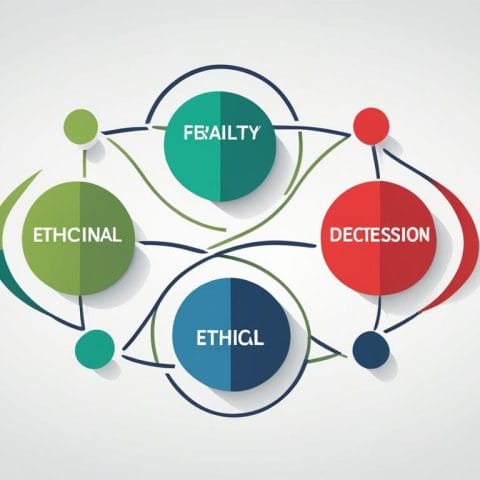Tapping into your emotional intelligence while working remotely is vitally important. But it can also be challenging, especially if your team is new to working from home or entered the virtual work world suddenly. In a remote work environment, words typed in an email carry more weight. Conversations held over the phone or Zoom do, too, when fewer discussions are voiced aloud among our teams. Being emotionally intelligent in a remote environment requires you to be a lot more intentional.
Key Takeaways:
- Emotional intelligence is crucial for effective virtual collaboration in remote teams.
- Working remotely requires intentional effort to recognize and manage emotions.
- Communication in a remote work environment holds more significance.
- Enhancing emotional intelligence skills can lead to improved relationships and job satisfaction.
- Practicing self-management and fostering social awareness are essential in virtual collaboration.
Why is Emotional Intelligence Important in Remote Teams?
Emotional intelligence (EQ) plays a crucial role in the success of remote teams. It is a competency that enables individuals to recognize, understand, and manage their own emotions, as well as recognize, understand, and influence the emotions of others.
Developing and applying emotional intelligence skills in a remote work environment is essential to prevent disengagement, lower job satisfaction, burnout, anxiety, and depression among employees. When team members possess high emotional intelligence, they are better equipped to navigate the challenges of remote work and maintain strong relationships, leading to a high-performing team.
Remote leaders, in particular, must be intentional about updating their emotional intelligence to effectively manage virtual team dynamics. By honing their emotional intelligence skills, leaders can create a supportive and engaging work environment, ensuring remote employees feel connected, valued, and motivated.
Benefits of Emotional Intelligence in Remote Teams
“Emotional intelligence is not only a ‘nice-to-have’ skill; it is essential in remote teams. It enables team members to effectively communicate, collaborate, and navigate challenges in a virtual environment, leading to increased productivity, innovation, and job satisfaction.”
Some key benefits of emotional intelligence in remote teams include:
- Enhanced communication: Emotional intelligence fosters clear and open communication, enabling remote team members to express their thoughts, ideas, and concerns effectively.
- Stronger collaboration: Emotional intelligence promotes empathy and understanding, allowing team members to collaborate more efficiently, even when physically separated.
- Increased employee engagement: Remote employees with high emotional intelligence feel more connected to their work, their team, and their organization, resulting in higher levels of engagement and commitment.
- Improved conflict resolution: Emotional intelligence equips team members with the skills to navigate conflicts and differences of opinion constructively, fostering a positive and inclusive work environment.
- Enhanced well-being: Remote employees with strong emotional intelligence can effectively manage stress, prioritize self-care, and maintain a healthy work-life balance.
By prioritizing emotional intelligence in remote teams, organizations can create a positive and supportive virtual work culture, leading to increased productivity and overall team success.
Practicing Self-Management in Remote Work
When working remotely, self-management becomes critically important. The shift from a traditional office setup to remote work requires individuals to cultivate a purposeful orientation and establish effective routines. By practicing self-management, remote workers can enhance their emotional resilience and maintain productivity.
Finding a Routine
One of the key aspects of self-management in remote work is establishing a daily routine. Having a consistent schedule helps create structure and boundaries between work and personal life. Remote workers can start their day with a set routine that includes activities such as exercise, meditation, or planning tasks for the day. This helps in setting a positive tone for the day and increasing focus and productivity.
Creating a Consistent Work Environment
Along with a routine, remote workers should strive to create a consistent work environment. Designating a specific area for work, preferably a separate room or a quiet corner, helps establish a psychological boundary between work and leisure. It also helps in minimizing distractions and creating a professional atmosphere, even at home.
“Self-management in remote work is about setting clear boundaries and creating an environment that promotes productivity and well-being.”
Leading by Example
Remote leaders also play a crucial role in practicing self-management. Leading by example not only sets a benchmark for the team but also promotes a culture of self-discipline and focus. Remote leaders can demonstrate self-management by effectively managing their own time, maintaining a consistent work routine, and prioritizing self-care.
Overall, practicing self-management in remote work is essential for achieving emotional resilience and maintaining productivity. By establishing a routine, creating a consistent work environment, and leading by example, individuals can navigate the challenges of remote work and maximize their potential.
Fostering Social Awareness and Relationship Management in Virtual Collaboration
Social awareness and relationship management play a crucial role in remote work, especially in maintaining a sense of connection among team members. In a virtual collaboration setting, sharpening listening and observation skills becomes essential for effective remote team communication. Paying attention to tone of voice, pace or volume of speech, and facial expressions or body language can provide valuable insights into understanding and empathizing with remote colleagues.
“Being emotionally aware and empathetic in virtual communication is key to building strong relationships within remote teams.”
By developing emotional awareness and team empathy, remote collaborators can bridge the physical gap and create a sense of emotional closeness that mimics in-person interactions. Seeking opportunities for social connection, such as virtual team-building activities or casual conversations, can help foster a positive and supportive work environment.
Regularly checking in with team members is also crucial to ensure their emotional well-being and maintain healthy relationships. It allows for open and honest conversations, where team members can express their concerns, share successes, or simply connect on a personal level. This level of connection enhances trust within the team, boosts morale, and promotes a sense of belonging.
Benefits of Social Awareness and Relationship Management in Virtual Collaboration:
- Promotes effective remote team communication and collaboration
- Builds trust and strengthens relationships among remote team members
- Fosters a supportive and empathetic work environment
- Enhances remote team productivity and overall job satisfaction
“Creating a strong sense of social awareness and actively managing relationships is vital for successful virtual collaboration.”
Enhancing Email Communication in Remote Teams
Effective email communication is essential in remote teams. In virtual collaboration, written communication takes precedence due to the absence of face-to-face interactions. To ensure clarity and efficiency, it is important to prioritize effective email practices.
1. Explain Ideas Clearly and Concisely
When composing emails, take the time to explain ideas thoroughly and in a concise manner. Provide sufficient context and background information to ensure recipients understand your message. Use bullet points or numbered lists to break down complex information and make it more digestible.
2. Be Clear and Specific
Avoid ambiguity in your email communication. Clearly state your intentions, objectives, and expectations. Use specific language and avoid jargon or technical terms that may not be familiar to all recipients. Being direct and straightforward helps prevent misinterpretation and confusion.
3. Pick up the Phone for Complex Conversations
While email is a convenient communication tool, it may not always be the most effective method for complex or nuanced discussions. If a topic requires more detailed explanation or immediate clarification, consider picking up the phone or scheduling a video call. Hearing someone’s voice and engaging in real-time conversation can bridge gaps in understanding and promote effective communication.
“Sometimes, a five-minute phone call can save hours of back-and-forth emails.”
4. Maintain Tidiness and Professionalism
Keeping your emails tidy and professional enhances remote team collaboration. Pay attention to grammar, spelling, and punctuation. Use proper formatting such as paragraphs, headings, and bullet points to improve readability. Remember to proofread before hitting the “send” button.
5. Use Email as a Documentation Tool
Emails serve as official records of communication in remote teams. When discussing important decisions, assignments, or agreements, summarize key points in writing. This ensures everyone involved has a documented reference to refer back to when needed.
By enhancing email communication in remote teams, you can promote clarity, efficiency, and collaboration. Implementing these best practices contributes to virtual team management and facilitates effective remote team communication.
| Email Communication Dos | Email Communication Don’ts |
|---|---|
|
|
|
|
Debriefing and Providing Feedback in Remote Team Meetings

Debriefing and providing feedback are critical aspects of effective remote team communication and virtual team management. By creating opportunities for informal debriefing after virtual meetings and seeking feedback from participants, teams can enhance their communication and collaboration.
One effective strategy is to schedule a debriefing session immediately following a virtual meeting. This allows team members to provide input, ask questions, and address any concerns or challenges that arose during the meeting. Encouraging open and honest communication during these sessions can foster a sense of trust and transparency within the team.
Informal Debriefing Checklist:
- Invite team members to share their thoughts and impressions of the meeting.
- Encourage participants to highlight what worked well and identify areas for improvement.
- Discuss any challenges or obstacles that were encountered during the meeting.
- Address any misunderstandings or miscommunications that may have occurred.
In addition to debriefing, seeking feedback from meeting participants is crucial for continuous improvement. Sending out a short survey or soliciting feedback through email can provide valuable insights on how to optimize the remote team meeting experience. It also demonstrates a commitment to actively listening to and incorporating the perspectives of the team.
“Feedback is the breakfast of champions.” – Ken Blanchard
Feedback Guidelines:
- Ensure feedback is specific, actionable, and constructive.
- Focus on behavior and outcomes rather than personal attributes.
- Be receptive to receiving feedback and open to suggestions for improvement.
- Recognize and acknowledge the efforts and contributions of team members.
By debriefing and providing feedback in remote team meetings, teams can enhance their communication and collaboration, leading to improved virtual team management and overall team performance.
Building Connection and Celebrating Milestones in Remote Teams
Building connection and celebrating milestones are essential in remote teams. In a virtual work environment, it’s crucial to find creative ways to foster a sense of connection and engagement among team members. Here are effective strategies to enhance remote employee engagement and promote virtual collaboration:
- Allotting time for unstructured social interaction: Incorporate dedicated time in virtual meetings for casual conversation and team bonding activities. This helps create a supportive and friendly atmosphere, allowing team members to connect on a personal level.
- Maintaining dedicated communication channels: Utilize virtual communication platforms that enable ongoing interaction and collaboration. Whether it’s a team chat room, project management software, or video conferencing tools, having dedicated channels for communication encourages frequent and seamless collaboration.
- Sending care packages: Surprise your remote team members with care packages delivered to their doorstep. These packages can include thoughtful items such as personalized notes, company-branded merchandise, or small treats. This gesture shows appreciation and fosters a sense of belonging.
- Hosting virtual celebrations: Organize virtual celebrations to recognize team milestones, achievements, or special occasions. Whether it’s a virtual happy hour, game night, or team-building activity, these events bring remote team members together and create shared memories.
By implementing these strategies, remote teams can overcome the challenges of physical distance and build a strong sense of connection and camaraderie. Engaged and connected team members are more likely to collaborate effectively, leading to improved productivity and success in virtual collaboration.
Supporting Remote Workers’ Well-Being

Supporting the well-being of remote workers is crucial for maintaining a happy and productive virtual team. Remote work can present unique challenges and it’s essential for employers to prioritize the emotional resilience and engagement of their remote employees.
Encouraging self-care: Remote employees often face increased stress and isolation. Encouraging them to prioritize self-care activities such as regular exercise, practicing mindfulness, and taking breaks can help reduce stress levels and improve overall well-being.
Regular check-ins: Maintaining open lines of communication is vital to ensuring remote employees feel supported and connected. Regularly checking in with individuals, either through one-on-one meetings or team check-ins, provides opportunities for them to share their challenges, successes, and concerns.
Recognizing good effort: Remote employees may not receive immediate feedback or recognition for their work like they would in an office environment. Taking the time to acknowledge and appreciate their efforts, whether through emails, team chats, or public recognition, goes a long way in boosting morale and promoting employee engagement.
Creating a supportive work culture: Fostering a positive and supportive work culture is crucial for remote workers’ well-being. Promoting teamwork, collaboration, and empathy among team members helps create a sense of connection and belonging, even in a virtual setting.
“Building a remote team that thrives requires intentional efforts to support employees’ emotional resilience and well-being.”
By prioritizing the well-being of remote workers, employers can create a positive work environment that promotes emotional resilience, job satisfaction, and engagement. Investing in remote employee engagement initiatives and nurturing a supportive work culture ensures that teams remain connected, productive, and successful even in a virtual setting.
Developing Emotional Intelligence Skills in Remote Teams
Developing emotional intelligence skills in remote teams is a continuous journey that requires deliberate effort, practice, and feedback. By honing these skills, teams can enhance remote team productivity, promote emotional resilience, and foster a positive and supportive work environment.
Interacting and Connecting with Team Members
Interacting and establishing connections with team members is crucial for developing emotional intelligence in remote teams. Encourage open and frequent communication through virtual meetings, video calls, and messaging platforms. Actively listen to team members, engage in meaningful conversations, and show empathy and understanding. By building strong connections, virtual teams can foster trust, collaboration, and mutual support.
Being Curious and Open-Minded
Developing emotional intelligence also involves cultivating curiosity and an open mind. Encourage team members to embrace diverse perspectives and engage in continuous learning. Encourage them to ask questions, seek different viewpoints, and consider alternative solutions. This fosters creativity, innovation, and adaptability within remote teams.
Seeking Feedback for Improvement
Seeking feedback is an essential component of developing emotional intelligence in remote teams. Encourage team members to give and receive constructive feedback openly and respectfully. Provide a safe environment where team members feel comfortable sharing their thoughts and ideas. Regularly evaluate team dynamics, identify areas for improvement, and implement strategies to enhance emotional intelligence.
“Emotional intelligence is not a destination, but a continuous journey of self-discovery and growth. Embrace the process and commit to developing your EI skills for the benefit of yourself and your remote team.” – Daniel Goleman
Measurement of Emotional Intelligence
Measuring emotional intelligence in remote teams can provide valuable insights and identify areas for development. Various self-assessment tools, surveys, and performance indicators can be used to gauge emotional intelligence levels within the team. These measurements can inform targeted training and development initiatives to further enhance emotional intelligence in remote teams.
| Benefits of Developing Emotional Intelligence in Remote Teams |
|---|
| Improved communication and collaboration |
| Enhanced trust and teamwork |
| Increased remote team productivity |
| Enhanced problem-solving and decision-making |
| Reduced conflicts and misunderstandings |
| Boosted remote employee engagement and satisfaction |
Developing emotional intelligence skills in remote teams is an investment in team success and overall organizational performance. By prioritizing EI training, remote teams can navigate challenges with emotional resilience, foster positive relationships, and achieve collective goals.
Conclusion
Boosting emotional intelligence in remote teams plays a crucial role in enhancing virtual collaboration and productivity. By practicing self-management, fostering social awareness, enhancing communication skills, and supporting the well-being of remote workers, teams can improve their emotional intelligence and reap the benefits.
Developing emotional intelligence skills in remote teams requires time and effort, but the results are worth it. With improved emotional intelligence, teams can foster better relationships, increase job satisfaction, and enhance overall team performance in the virtual environment.
As remote work becomes more prevalent, remote leaders and managers must prioritize virtual team management and remote leadership skills to effectively cultivate emotional intelligence in their teams. By prioritizing these skills, teams can create a collaborative and supportive remote work culture that enhances emotional intelligence and drives success.
FAQ
Why is emotional intelligence important in remote teams?
Emotional intelligence is crucial in remote teams because it helps prevent disengagement, lower job satisfaction, burnout, anxiety, and depression among employees. It also enables leaders to handle the dynamics of remote work and ensure a high-performing team.
How can I practice self-management in remote work?
To practice self-management in remote work, it’s important to establish a routine for starting the day and create a consistent work environment. Remote leaders should also demonstrate self-management to set an example for their teams.
How can I foster social awareness and relationship management in virtual collaboration?
To foster social awareness and relationship management in virtual collaboration, sharpen your listening and observation skills, pay attention to tone of voice, pace or volume of speech, and facial expressions or body language. Creating opportunities for social connection and checking in with team members also helps.
How can I enhance email communication in remote teams?
To enhance email communication in remote teams, take time to explain ideas well in writing, be clear and specific, and consider picking up the phone for complicated or nuanced conversations. Being tidy and appropriate in email communication helps avoid miscommunication and enhances remote team collaboration.
How can I debrief and provide feedback in remote team meetings?
To debrief and provide feedback in remote team meetings, create opportunities for informal debriefing, seek feedback from participants, and ensure constructive feedback is given. This enhances communication and collaboration in remote teams.
How can I build connection and celebrate milestones in remote teams?
To build connection and celebrate milestones in remote teams, allot time for unstructured social interaction in meetings, maintain dedicated communication channels, send care packages, and host virtual celebrations. These are effective ways to foster connection and enhance remote employee engagement.
How can I support remote workers’ well-being?
To support remote workers’ well-being, encourage self-care, regular check-ins, recognize good effort in writing, and create a supportive work culture. These actions can reduce stress, improve job satisfaction, and enhance emotional resilience in remote teams.
How can I develop emotional intelligence skills in remote teams?
To develop emotional intelligence skills in remote teams, interact and connect with team members, be curious and open-minded, and seek feedback for improvement. Measurement of emotional intelligence can be done through self-assessment tools, surveys, and performance indicators.
Why is boosting emotional intelligence crucial for effective virtual collaboration?
Boosting emotional intelligence in remote teams is crucial for effective virtual collaboration because it helps improve self-management, social awareness, and communication skills. It also supports the well-being of remote workers and enhances overall team productivity.
How can I ensure remote leadership success in managing virtual teams?
Remote leadership success in managing virtual teams can be achieved by tapping into emotional intelligence, practicing self-management, fostering social awareness, enhancing communication skills, supporting remote workers’ well-being, and continuously developing emotional intelligence skills within the team.





